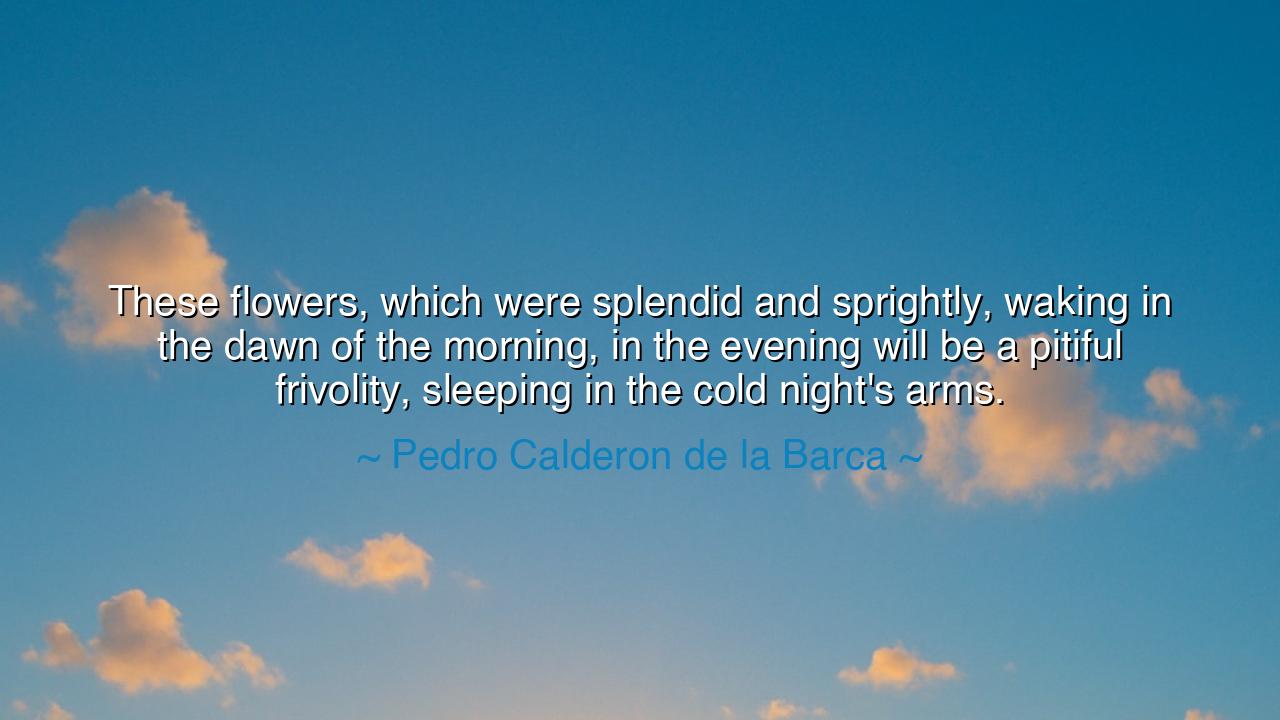
These flowers, which were splendid and sprightly, waking in the
These flowers, which were splendid and sprightly, waking in the dawn of the morning, in the evening will be a pitiful frivolity, sleeping in the cold night's arms.






Hearken, O children of fleeting beauty and mortal contemplation, to the words of Pedro Calderón de la Barca, whose pen traced the tender impermanence of life: “These flowers, which were splendid and sprightly, waking in the dawn of the morning, in the evening will be a pitiful frivolity, sleeping in the cold night’s arms.” Here lies a meditation upon the transient nature of beauty, youth, and vitality, a reminder that all that flourishes under the sun is destined to bow to the inexorable march of time.
Calderón, the luminary of the Spanish Golden Age, contemplates not only flowers but the human heart mirrored in their brief bloom. The morning’s splendor represents moments of vitality and promise, the radiant display of potential and life’s joys. Yet, as dusk approaches, the frivolity of those same flowers signifies the fragility and ephemerality inherent in all things that grow, flourish, and awaken to the world. In this, he teaches that life’s glories are not eternal and that their appreciation demands presence and attentiveness.
Consider the life of Alexander the Great, who, in his prime, conquered empires and shaped the world with brilliance unmatched. Yet, in the short span of his years, even his might could not withstand the inevitability of death. The splendid bloom of his achievements, though immortalized in history, faded with time, leaving the echo of triumph tempered by the sorrow of mortality. Calderón’s flowers whisper the same truth: all that awakens gloriously must, in the night, surrender to impermanence.
The essence of this reflection lies in mindful recognition. To see a flower in full bloom is to witness a fleeting miracle; to observe its evening decay is to understand the cycles that govern all existence. The poet calls upon the observer to cherish the morning’s radiance, to embrace joy, beauty, and vitality fully, yet to remain conscious of life’s transience. This awareness is neither despairing nor morbid—it is the path to wisdom, teaching gratitude, humility, and attentive appreciation.
In our own lives, this lesson is ever-relevant. Youth, health, opportunity, and passion blossom like the morning flowers, vibrant and full of promise. Yet these too are subject to the evening’s cool grasp, the inevitability of decline. Calderón instructs us to cultivate presence, to savor our splendor without clinging blindly, and to prepare our hearts for the inevitability of change. The fleeting nature of beauty and vitality magnifies their value; the awareness of impermanence sharpens the clarity with which we live.
The historical example of Jane Austen offers a human echo of Calderón’s meditation. Her novels, filled with acute observation and wit, capture the splendor and folly of society in vivid detail. Yet even her brilliance, like the flowers of morning, was bound by the limits of life and circumstance. Her work teaches us to embrace creation, insight, and beauty while mindful of mortality, leaving a legacy that outlasts ephemeral moments yet remains grounded in the wisdom of transience.
O children of the ages, take this teaching to heart: cherish the splendid moments, the vitality, the beauty, and the passions that awaken with the dawn. Observe them, savor them, and let them inspire gratitude and creativity. Yet also cultivate acceptance, humility, and wisdom, for the evening will come, and the same blossoms that delighted the eye will rest quietly in the cold arms of night. In understanding impermanence, one finds both peace and intensity of life.
Thus, let the words of Pedro Calderón de la Barca echo through the corridors of your days: life’s flowers bloom brilliantly, yet briefly; beauty dazzles, yet fades. Embrace the splendor without attachment, honor the frivolity without despair, and cultivate a heart attuned to the rhythms of birth, growth, and decay. In this dance of time, wisdom is found—not in clinging, but in witnessing, appreciating, and living fully in the fleeting light of morning.
If you wish, I can also create a practical meditation on impermanence and presence inspired by Calderón’s imagery, showing daily exercises to honor fleeting beauty and cultivate mindful living. Do you want me to do that?






AAdministratorAdministrator
Welcome, honored guests. Please leave a comment, we will respond soon